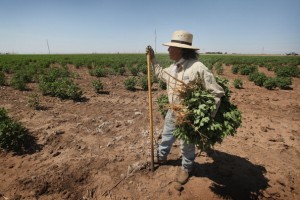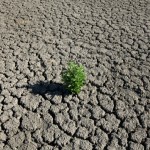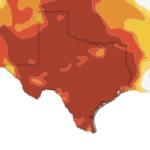Legislation Would Require Water Well Owners to Report Usage

Photo by Scott Olson/Getty Images
Juan Rico culls cotton plants growing between rows in an irrigated cotton field July 27, 2011 near Hermleigh, Texas. A new bill would require most farmers to report their water usage to the state.
A Texas lawmaker has introduced a bill that would help the state keep better track of how much water it’s using. State Senator Kel Seliger, R-Amarillo, has filed a bill, SB 272, requiring most farmers to report their water usage to the Texas Water Development Board.
“It’s important to have an empirical measure of groundwater being removed from the modeled available groundwater,” Seliger tells StateImpact Texas. “So we know where we are at all times.”
Most of the water in Texas is used for farming and ranching, 56 percent of it. And much of that water comes from sources underground. So water planners need to understand how much is being used from those resources they can’t necessarily see. The Ogallala Aquifer in the Texas Panhandle, for instance, experienced its largest drop in 25 years in 2011.
Water in many parts of the state is managed by Groundwater Conservation Districts (GCDs), which number near a hundred and are mostly created by the legislature to help balance water needs and supplies. At the moment, neither the Texas Water Development Board or groundwater districts require water withdrawal reporting, according to the bill’s analysis by the non-partisan Senate Research Center. (Some groundwater districts already require reporting, but this law would make it mandatory.)
So does this mean farmers and ranchers would have to install meters on their wells?
“Certainly not,” Seliger says. “It just requires that individuals report to their groundwater districts what their production is.” There are various methods to monitor withdrawals, Seliger says, even “pure estimates” based on the hours of the day the wells are pumping.

Photo courtesy of Kel Seliger
State Senator Kel Seliger, R-Amarillo, has filed a bill that would require most farmers to report their water usage to the state.
While the bill wouldn’t necessarily require farmers to put meters on their wells per se; the current language could be interpreted to allow the Water Development Board to determine how the data on withdrawals is collected, potentially requiring metering. And that has some in the agricultural community hoping to tweak the bill’s language.
“The language in the bill, it sounds like it’s doing more than just making sure the Water Development Board gets the information they need,” says Billy Howe, State Legislative Director with the Texas Farm Bureau. Seliger has said that’s not the intent of the legislation.
“That’s one of the things we need to work on as far as the language in the bill is concerned,” Howe says, citing concerns that metering can be expensive to add to existing wells. “We’re just gonna work on it and see if we can all agree to some language,” Howe says.
Some groundwater districts already require reporting, Howe says, while others use monitoring wells.
Domestic and livestock water wells are exempt from the new rule, as are smaller wells that have a capacity of less than 100 gallons per minute.
Not exempt from the new reporting rules? Well owners outside of groundwater districts, living in what are called “white areas,” who will have to report their usage directly to the Water Development Board. That’s necessary, Seliger says, because “you may be using water in a given aquifer, even though you’re not in a groundwater conservation district.”
“We really don’t have an issue with his intent to get better data,” says Howe with the Farm Bureau, but the group is concerned about the new requirements for those not in a groundwater district. “Those folks have chosen not to be under regulation.” Howe says, “so they’re just not going to be enthusiastic about a state agency saying they’re going to have to report their groundwater withdrawals to them.” He calls this part of the legislation a “sticking point.”
The bill has already had one hearing the Senate Natural Resources committee, where it’s currently pending.

